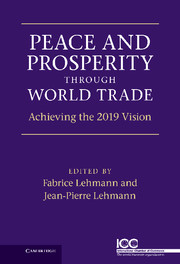Book contents
- Frontmatter
- Contents
- Notes on contributors
- Foreword
- Preface: the ICC vision
- Historical overview and dynamics
- Editorial note
- A Global systemic transformations
- B Governance of global trade
- C Poverty and global inequities
- D The long view on interlocking crises
- E Global business responsibilities
- Editorial introduction
- E1 Responsible leadership
- E2 For great leadership
- E3 A lesson on trade, regulation and competition policy?
- E4 International trade and business ethics
- E5 Who's driving twenty-first century innovation? Who should?
- E6 Responsible sourcing
- E7 Trade, international capital flows and risk management
- E8 Trade, corporate strategies and development
- E9 How can trade lead to inclusive growth?
- E10 Trade and human rights: friends or foes?
- E11 Trade: the spirit and rule of law
- Conclusion: the imperative of inclusive global growth
- Index
E5 - Who's driving twenty-first century innovation? Who should?
Published online by Cambridge University Press: 05 July 2011
- Frontmatter
- Contents
- Notes on contributors
- Foreword
- Preface: the ICC vision
- Historical overview and dynamics
- Editorial note
- A Global systemic transformations
- B Governance of global trade
- C Poverty and global inequities
- D The long view on interlocking crises
- E Global business responsibilities
- Editorial introduction
- E1 Responsible leadership
- E2 For great leadership
- E3 A lesson on trade, regulation and competition policy?
- E4 International trade and business ethics
- E5 Who's driving twenty-first century innovation? Who should?
- E6 Responsible sourcing
- E7 Trade, international capital flows and risk management
- E8 Trade, corporate strategies and development
- E9 How can trade lead to inclusive growth?
- E10 Trade and human rights: friends or foes?
- E11 Trade: the spirit and rule of law
- Conclusion: the imperative of inclusive global growth
- Index
Summary
Innovation will drive the future, but who's driving innovation? In modern, market-based societies this is a question of some import. We live in a time of impending crisis. Our planet's fragile ecological inheritance is being carelessly squandered and the ‘seas of change’ are literally rising as we dawdle. At the same time, the one resource that we do have that can offer us a chance at salvation – the creative power of the human intellect – is at risk of being wasted in complex organizations that all too often have become ‘prisons of the soul’. This goes beyond mere frustrations over business as usual; this is vitally important to us all: who speaks for the species at a time such as this?
Popular imagination typically ascribes the innovative role to ‘independent inventors’ – contemporary ‘Davids’ struggling against massive industrial ‘Goliaths’, with nothing but goodwill on their balance sheets and only altruistic objectives on their minds. Ah, if only this were true! The reality is, in fact, quite different. The great bulk of twenty-first century innovation will be pursued in the private, non-governmental sector, led mostly by big and multinational firms, operating from a handful of favoured locations, mostly in the developed world. Is this good? Well, first of all, it's not a choice, but a reality, so the question might be moot; but then the real question becomes: is this what we want?
- Type
- Chapter
- Information
- Peace and Prosperity through World TradeAchieving the 2019 Vision, pp. 253 - 258Publisher: Cambridge University PressPrint publication year: 2010

